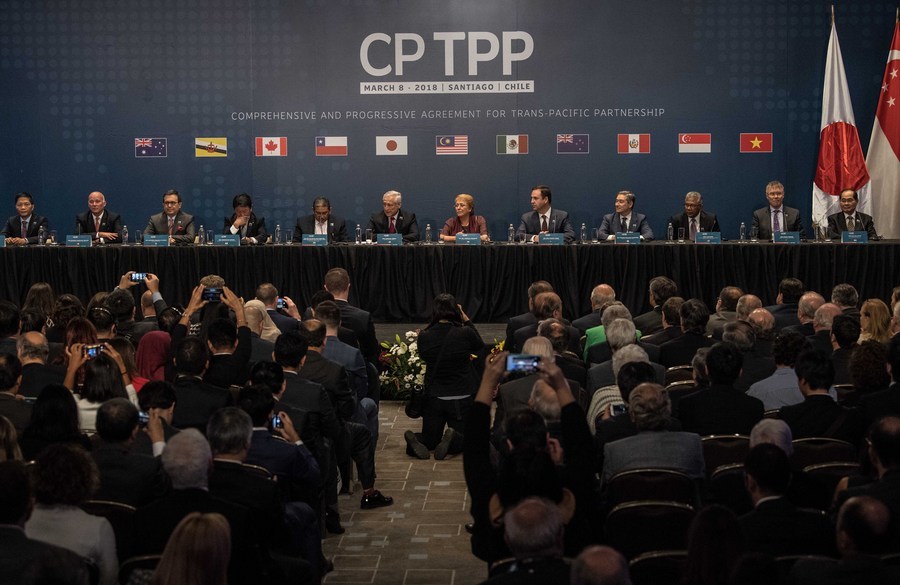
Chilean President Michelle Bachelet (6th R), Chilean Foreign Minister Heraldo Munoz (6th L) and delegates from other countries attend a signing ceremony in Santiago, Chile, on March 8, 2018. Ministers from 11 countries gathered in Chile's capital to sign the Comprehensive and Progressive Agreement for Trans-Pacific Partnership (CPTPP). (Photo: Xinhua)
Chinese State Councilor and Foreign Minister Wang Yi will visit Japan and the Republic of Korea from Tuesday to Friday.
The back-to-back visits provide Wang with an opportunity to mediate the existing divergences between Japan and the ROK, which would benefit regional integration.
Countries in the post-pandemic era all have the need to strengthen economic and trade exchanges. The International Monetary Fund predicts that the global economy will shrink by 3 percent this year, the worst economic recession since the Great Depression in the 1930s. The outbreak of the novel coronavirus has blocked the flows of people, capital and goods, and damaged the global supply chains and even triggered worries about the reversal of economic globalization. In this context, China and other countries have not only the important task of promoting their own economic recovery in the post-pandemic era, but also the responsibility of maintaining multilateralism and free trade.
It is against this backdrop that the Regional Comprehensive Economic Partnership agreement, which includes China, Japan and the ROK, was signed earlier this month.
Some in Japan are now calling for China to be a participant in the Comprehensive and Progressive Agreement for Trans-Pacific Partnership-a trade agreement between Australia, Brunei, Canada, Chile, Japan, Malaysia, Mexico, New Zealand, Peru, Singapore, and Vietnam that evolved from the Trans-Pacific Partnership, which never entered into force due to the withdrawal of the United States.
The outbreak of the novel coronavirus has prompted China, Japan and the ROK to accelerate their free trade negotiations, which has encouraged both China and Japan to think of further deepening their economic and trade cooperation under the CPTPP framework.
Japan led the efforts to keep the agreement alive after the US withdrew. Therefore, Sino-Japanese relations are an important factor in whether China will join the CPTPP. After working together to fight the epidemic, China and Japan have gathered a broader consensus, and the relationship between the two countries has also shown a positive development trend, which has created a better environment for China to join the CPTPP.
If China should join the CPTPP, while opening up a new channel for its own economic and trade development, it can also strengthen its economic and trade ties with other countries and inject stronger impetus into regional economic integration.
Thus an initiative that was originally set up to counter China's regional economic influence might at last open its door to allow the region to better benefit from it.


